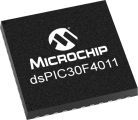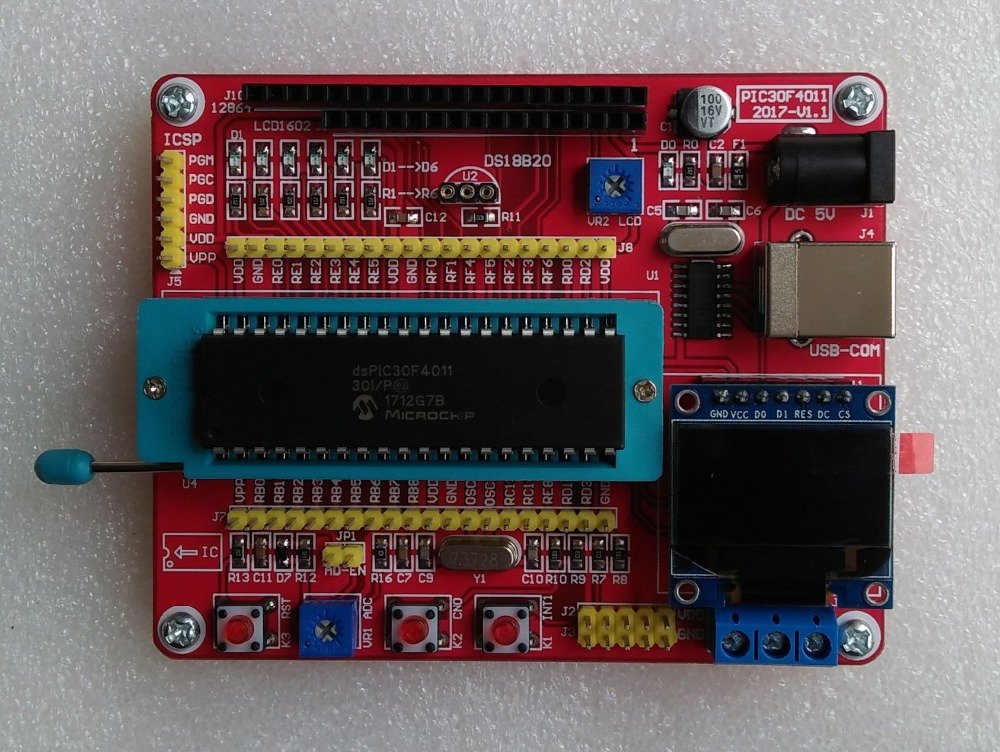In this article we look at some new hardware that I recently purchased, in this case I was looking at the DsPic controllers. In this case we look at the DsPIC30F4011
Lets have a look at the DsPIC30F4011 controller, here are some of the highlights that I picked out of the controller
- High-Performance dsPIC30F core
- C compiler optimized instruction set architecture
- 24-bit wide instructions, 16-bit wide data path
- Up to 30 MIPS operation
- DSP Engine for math intensive operations
- Modulo and Bit-Reversed Addressing modes
- Two, 40-bit wide accumulators with optional saturation logic
- 17-bit x 17-bit single cycle hardware fractional/ integer multiplier
- Single cycle Multiply-Accumulate (MAC) operation
- 40-stage Barrel Shifter
- Operating Conditions
- Wide operating voltage range (2.5V to 5.5V)
- Industrial and Extended temperature ranges
- Peripheral Features
- High current sink/source I/O pins: 25 mA/25 mA
- Optionally pair up 16-bit timers into 32-bit timer modules
- 3-wire SPI™ modules (supports 4 Frame modes)
- I2C™ module supports Multi-Master/Slave mode and 7-bit/10-bit addressing
- Addressable UART modules with FIFO buffers
- 1 CAN module, 2.0B compliant
- Motor Control PWM Module Features
- Motor Control PWM Module with Complementary or Independent Output modes
- Edge and Center Aligned modes
- Multiple duty cycle generators
- Dedicated time base with 4 modes
- Trigger for synchronized A/D conversions
- Quadrature Encoder Interface Module Features
- QEI with Phase A, Phase B and Index Pulse input
- 16-bit up/down position counter
- Position Measurement (x2 and x4) mode
- Programmable digital noise filters on inputs
- Alternate 16-bit Timer/Counter mode
- Interrupt on position counter rollover/underflow
- Analog Features
- 10-bit 1 Msps Analog-to-Digital Converter (A/D)
- A/D Conversion available during Sleep and Idle
- 4 Sample/Hold Channels
- Multiple Conversion Sequencing Options
- Special Microcontroller Features
- Enhanced Flash program memory with 10,000 erase/write cycle (min.) for industrial temperature range, 100K (typical)
- Data EEPROM memory with 100,000 erase/write cycle (min.) for industrial temperature range, 1M (typical)
- Self-reprogrammable under software control
- Power-on Reset (POR), Power-up Timer (PWRT) and Oscillator Start-up Timer (OST)
- Flexible Watchdog Timer (WDT) with on-chip low power RC oscillator for reliable operation
- Fail-Safe clock monitor operation
- Detects clock failure and switches to on-chip low power RC oscillator
- Programmable code protection
- In-Circuit Serial Programming™ (ICSP™)
- DC to 40 MHz external clock input
- 4 MHz-10 MHz oscillator input with PLL active (4x, 8x, 16x)
- Programmable Brown-out Detection and Reset generation
- Sleep, Idle and Alternate Clock modes for power management
So a cracking controller with a lot of features, so I decided to purchase a reasonably priced development board
Development Board
Here is the board I bought from Aliexpress
So as you can see it uses a DIL controller chip which is handily connected via a ZIF socket. This means you can easily program and experiment using this board and then swap the controller out to your own board if desired.
Here is a list of the resources on the board
- Reset button.
- 7.3728M External Crystal Oscillator
- 2 push button switches which are connected to CN0 and INT1 respectively
- Six LEDs that are connected to RE0-RE5 IO port.
- ADC potentiometer.
- Integrated USB serial port circuit, computer can also do UART communication experiment without serial port.
- External 5V DC Power Supply Interface
- ICSP programming simulation interface which you can use with a suitable programmer/debugger such as (PICKIT2 PICKIT3 ICD2 ICD3, etc.).
- All I/O and pins are brought out to headers
- DS18B20 temperature sensor interface
- LCD1602 LCD Interface connector
- LCD 12864 LCD Interface connector
- OLED LCD fitted
- CAN connector
Parts List
The board costs about $25
| Description | Link |
| DsPIC30F4011 Development Board | DsPIC 30F4011 Development Board/dsPIC Experimental Board/System Board/ |
Link
Datasheet – http://ww1.microchip.com/downloads/en/DeviceDoc/70135G.pdf



